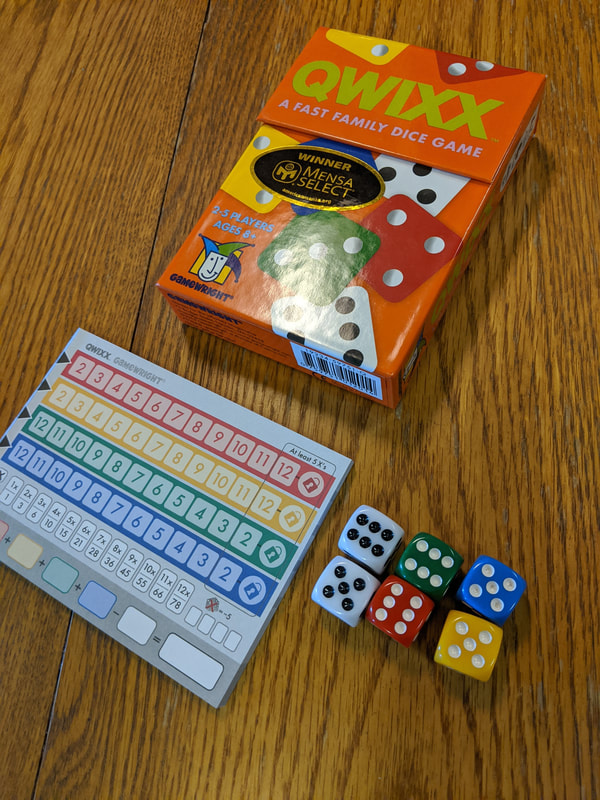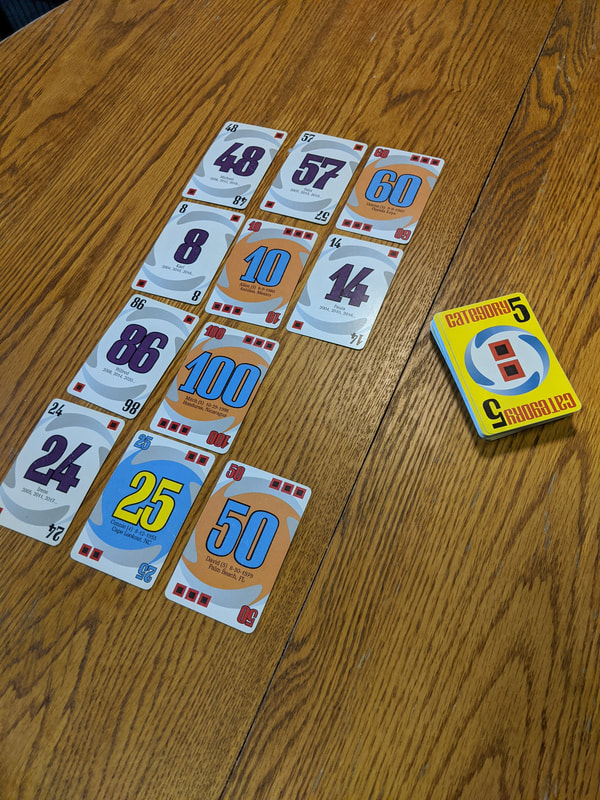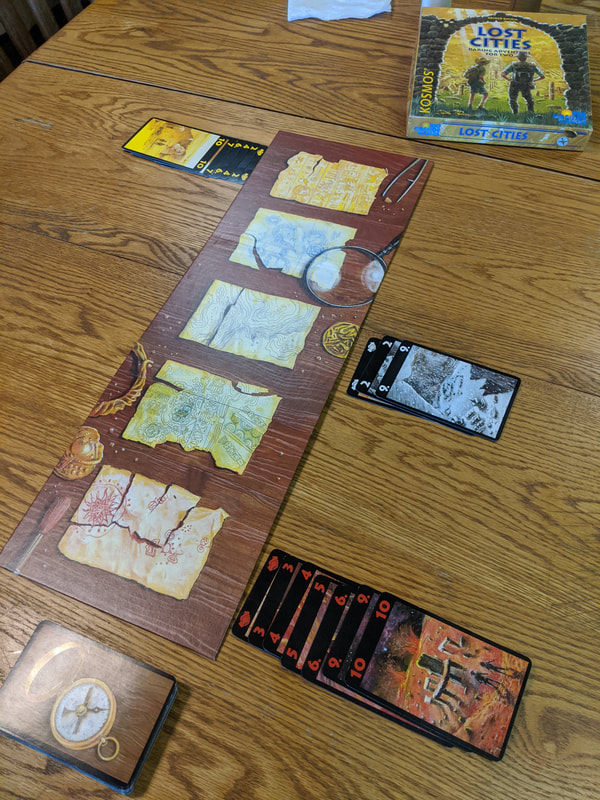|
Wait, when did this become an EDUCATIONAL blog!? Blasphemy, I know, but hear me out for a moment. When spending time with my extended family, I'm often the one called upon to entertain or regale them with a new game to play that they've never heard of. Unlike my side of the family, though, this other side doesn't necessarily share the same intuitive enthusiasm for tabletop play and focus. However, my niece and father in law are both very curious, and will always try something new with fervor and flexibility, even if it isn't their norm. So each night of our socially distant "vacation", I have taught them a game. Nothing too crazy - no Power Grid or Defenders of the Realm territory; this is NOT the population to play-test my RPG-in-a-box (the last test, though awesome, ran 4 hours straight). No, I'm giving them games that are completed in 15-30 minutes tops. Games with simple rules that are easy to pick up, but challenging to master. And in playing and teaching these games, I noticed something revealing. I've played these games before, but not extensively. The rules and mechanics are few, but structuring and planning your moves takes forethought, organization...and MATH. Yeah, you heard me. Organizational, quick recall, multiplication, probability, and risk assessment. I am not a genius [though I've never been tested ;) ]. I have struggled with so many facets of my life that others excel at in common practice. And yet, I was executing key functions of my play in record time (apparently). Chunking numbers and weighing moves with precision and poise, ready to help my fellows immediately if asked, because I could SEE all of their options laid out. And to think on this more deeply, it is simply that I have had more PRACTICE utilizing these skills than they have. I've always had a good "math brain." Numbers and probability blended with mechanics and organization; this is why business and budgeting come so easily. And when I play these games with others who have also a history of tabletop gaming, I find that they, too, have obtained a general skill-set in "quick" math and organization, and I venture that this is because they practiced like I did. We practiced through play. So let me share with you three simple games that are quick on the draw and you can be certain are also helping you and your kid master some math facts (DON'T TELL THEM). Chunking and Pairing - QuixxQuixx is a game you learn in minutes. On your turn you roll six dice (2 white, then one each of Blue, Yellow, Green, and Red); then you make one or two choices based on what you rolled. You make these decisions in order. 1) You add the two White dice together, and decide to use that number or not (and other players can do this). 2) You pair ONE White die with one of the colored dice and add those together (only the active player does this). You decide to use one or both of the numbers you've "chunked" and cross them off - white is any color you want (#1), color is the color that white is paired with (#2). The thing to remember in Quixx is that each row is accessed from left to right in sequence. This means that if you cross out your Red 4, the game actually tells you to put a line through 2 and 3 on your sheet. That's because you no longer have access to them, even if you roll a "2" or "3" later. And you HAVE to cross off SOMETHING, whether it be the White, the Color Pair, OR, if neither of those are desired or possible, a Penalty Box (the game ends after four of those are crossed off). As you cross off more colors, your end score is multiplying, so more crosses in any color is a good idea. However, after you have at least FIVE crosses in a color, if you roll (or someone else rolls with White on their turn) the furthest number to the right, you can cross off THAT number and the Lock symbol next to it, and LOCK that color. This removes it from the game, and nets you two more crosses for your total. When two colors are Locked, the game ends. With that impetus, the game becomes a balance between holding out for those low or high numbers, trying to avoid penalty boxes, and trying to end the game faster by Locking two colors. Building Skills: every turn you're rolling dice, chunking quick addition, and comparing those values to desired outcomes. Us D&D folks do this all the time when we roll our favorite greatsword or fireball, so our eyes are used to putting together the numbers into easier sets to add, but the additional value comparison and choice of strategy adds a new layer to that judgement. Simple, yet complex. Anyone playing will get A LOT of practice in quick number crunching and value assignment. Probability and Risk Management - Category 5 / 6 NimmtThe game known as 6 Nimmt was a joy to play in my household growing up. Introduced to us by my eldest brother, the deceptive German game involves placing numbers in rows by the closest ascending value, filling slots in each row. If your number WOULD HAVE filled the sixth slot in a row, you must collect the five previous cards and add them to your score pile. Your "sixth" card then becomes the first in the new row. This is a game like golf. Points are bad. Each card has upon it a certain number of oxen, each worth a point. Cards have anywhere from one to seven points, and with how the game is played, some rows can add up VERY QUICKLY. But it's not all terrible. The game uses a deck of 104 cards and can be played with anywhere from 2 - 10 players. Each player starts with a hand of 10 cards each and selects in secret each round what card they'll play. After 10 rounds, everyone's hands are empty and we total up how much each of us took. This keeps rounds moving, but how many people are actually playing MATTERS in terms of probability. See, with 2 players, you deal 10 to each player, then set out 4 cards to begin each of the four rows. That's only 24 cards out of 104 that are in play. You don't draw cards during the round, so what you have is what you have. Now why does that matter? We each select a card every round and place it face down in front of us. When each of us has selected a card, we flip them at the same time. After that, the outcome to the round is mostly automated. The lowest number is placed first - it goes in ascending order within the closest distance to a number. If we use the above example, where the right-most number in each row is what we are comparing against, and with three players, we had the following numbers: 54, 16, 87. 16 is placed first, settling in right next to the 14. It is the closest row number in ascending order. After that, 54 is placed...next to the 50, but not the 60, as 60 is higher than 54. The 87...is placed next to the 60. But wait! 87 is closer to 100 than it is to 60! But the numbers must be in ascending order. 100 to 87 would be a DEscending order. Say there were more cards in those rows, and the row ending in 50 was one of them. The fifth card in the row is 50, 54 would be its sixth card - but each row can only have 5 cards, so the 50 row is collected by the player who played the 54, and their 54 starts the new row. That stack of 5 cards? Well congratulations! Add those to your score pile and get ready for the next round! But what if someone plays a card that's lower than all of the right-most numbers? Well, my dear adventurers, that person (if they go first), will have a choice. If your number is lower than everything, you choose the row you want (some are better than others), taking the lesser of two evils, and your card becomes the new row (regardless if the old row had 1 or 3 or 5 or any number cards). Pay attention, though; as the row you take may mess up another's plans in probability... The reason this game changes so dramatically with the number of players is clear when you think about probability. the game runs 10 players at max with 10 cards each (that's 100 cards), then 4 cards to get things started. That means...EVERY number from 1-104 is now in play. Now your decisions have a lot more variables to consider, many of them in the form of OTHER PEOPLE and their own strategies. With less people, you can gauge different risk with less ranges of cards in play each round. It's a fascinating, fast game, with a deep strategic backbone, and a rule set of a few sentences. Building skills: risk management, probability, judgement, counting, and chunking. Sometime in the span of 10 years ago, 6 Nimmt went out of print, but its mechanics and rights were bought and reprinted in the form of Category 5. Same game, but with hurricanes instead of bulls. *shrug* Investment, Multiplication, and Risk Management - Lost CitiesIn Lost Cities, you take the form of an archaeologist or mining explorer, seeking treasure and profit from five possible sites, and competing with only one other person.
Another game involving ascending order, you place numbers in sequential order to accumulate points (profit) in the sites you want to invest in. You can't always get all the numbers you want, though, and will have to make choices carefully on when to place that 9 when you're still holding out for the 8. But I'm getting ahead of myself. On your turn, you Play A Card - investing in a dig, or "discarding" a color onto the divider that splits the board in two equal sides - then Draw A Card [either from the ever-diminishing deck OR from the top of a discard pile from the divider]. "One man's trash" and all that. INVESTING IN A DIG You invest in a dig by placing a card on your side of the divide in front of the color you desire. The number and color should match. From here, on subsequent turns, you try to place as many cards as you can in the dig to make a profit, but it ain't easy. There are two main factors in your way: 1) Ascending Sequence and 2) ...Costs. Ascending Sequence means that the numbers you place must be in ascending order. You put down a 3 one turn, then a 4 next turn, then a 6 after that (and draw a 5!)...you cannot place that 5. It's too late. Each color only has 2-10 to work with in this regard. Costs refer to the upfront cost of your dig. It comes up in end-game scoring, but you NEED to keep it in mind up front. ANY DIG you start automatically incurs a -20 point penalty. Things cost things. Tough. HOWEVER, the full range of numbers at your disposal can usually bump you over 20 points if you're paying attention. For example, I start digging in Red and over many turns put down 3-5-6-8-9-10. Add all those up and you've got 41... Subtract 20 for costs, and my score ends up being 21 for that dig. Factor in that you'll probably invest in 2 or 3 digs per game and that can add up...or 2 go really well and 1 BOMBS. But there's a third factor that can work for you or against you: PARTNERS. Represented by a little card of gentlemen shaking hands, you can have up to 3 partners (probably investors, but you get the idea) in your dig's stack, but they must be played at the beginning of the sequence. One card takes your end score (after the -20) and multiplies it by 2. 2 cards = x3. 3 cards = x4. Sounds pretty great, right? Except this can backfire. If you don't turn a profit, your partners don't either, and those multipliers count with negative points too. So I've got two partners up front, then my 21 in total from above. 21 x 3 = 63 points. Huzzah! But my other dig has three partners up front and I only managed to get a measly 3 and 9 on it. 12 - 20 = -8... x 4 = -32. All told, I'm actually back to 41, but that was an ouch, and if you're not careful with your spread, things can get real tough for you when the piper comes to collect his debts. Building Skills: My wife and I LOVE this game. There are many strategies to win and it's a great way to cultivate patience, risk management, and portfolio business. Plus, with the game ending once the deck is depleted, using that "discard" option is a leet hacker play to prolong the game so you can get that last...10...down! Happy gaming. -Adamus
0 Comments
|
Adam SummererProfessional Game Master musician, music teacher, game designer, amateur bartender, and aspiring fiction author. Honestly, I write what I want when I want. Often monster lore, sometimes miniature showcases, and the occasional movie/show review.
Archives
April 2024
Categories
All
|



 RSS Feed
RSS Feed